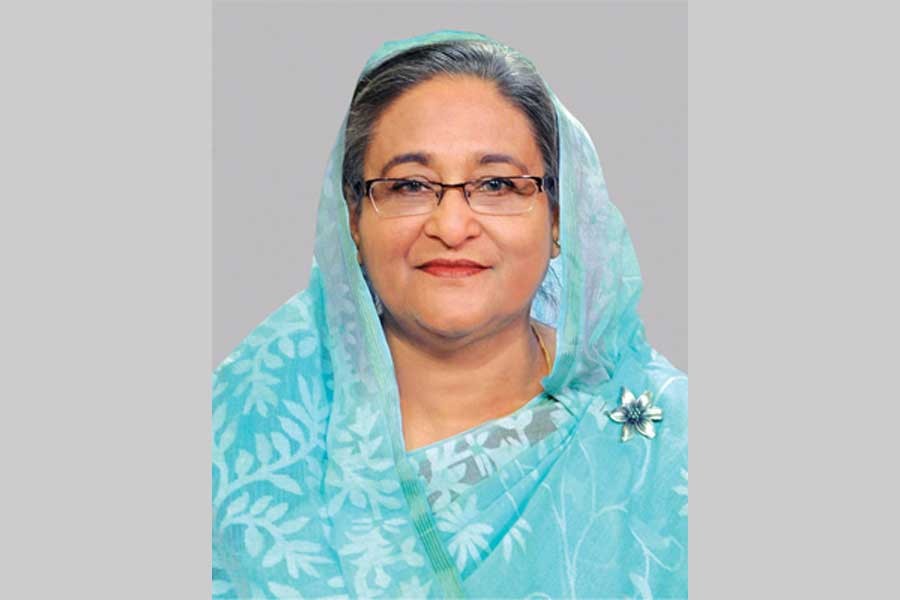A grenade attack that killed 24 people 17 years ago was aided by the ruling BNP-Jamaat alliance of the time, said Prime Minister Sheikh Hasina, who was the key target of the horrific attack.
The prime minister made the remarks after joining an Awami League discussion via video conference on Saturday to commemorate the lost lives and the injured, reports bdnews24.com.
On Aug 21, 2004, the attackers used a series of grenades to attack an anti-terrorism rally organised by the Awami League, killing Ivy Rahman, the party’s women’s affairs secretary and wife of the late president Zillur Rahman, and 23 others. Several hundred party activists were also wounded.
Hasina, the then opposition leader and now the current prime minister, survived the attack with damaged hearing.
The investigation into the case revealed the attack aimed at making the Awami League leaderless by killing Bangabandhu’s daughter and that the attack had received support from top leaders of the ruling BNP-Jamaat alliance.
“Usually, when these kinds of things happen, police rush forward to help and save the injured,” Hasina said on Saturday, reminiscing about the day of the attack. “But it was the complete opposite that day. Instead, when activists from our party rushed forward to help, they were blocked and teargas was used on them.”
“What does that mean? It means that teargas and batons were used to protect and rescue the attackers. And if a government does not support such an attack, it is impossible to carry out.”
In order to distract from the truth of the attack, the BNP-Jamaat alliance orchestrated the arrest of a poor man named Joj Mia and gave him assurances that his family would be taken care of if he took responsibility for the attack, Hasina said.
“Whereas [Joj Mia] didn’t have the money to buy such grenades or hire anyone to throw them. They also arrested Mogbazar Awami League leader Mokhles on false charges and planned to arrest and get false confessions from Awami League activists to make it seem as if the attack was due to intra-party conflict.”
“You know that a grenade was found inside the jail, next to the wall. Some famous newspapers tried to draw diagrams to show that the grenade was thrown from a nearby building.”
“But there were no such buildings in the area where such a thrown grenade could have come from. The truth is they gathered some criminals in the area – some of whom had been brought from jail. But they were unable to throw all the grenades they gave to them.”
“Another had fallen in an alley near Ramna Hotel. And materials were found in various nearby places. A jailer was involved and the attackers were brought back to the prison.”
On the night of the attack, four of the attackers were sent overseas aboard a Singapore Airlines flight, said Hasina.
One of them was jailer Tajuddin. Hasina said it was heard that Bangabandhu’s killers Col Rasheed and Dalim were in Dhaka at the time and were under the care of Khaleda Zia and her son Tarique Rahman. “The detective agencies, DGFI, NSI and police – all of them were involved.”
Hasina said the Khaleda administration had saved the attackers and created opportunities for them to flee abroad.
“When they learnt that I had survived, they made the decision to flee abroad.”
In 2018, a Dhaka court sentenced 19 of the 49 suspects in the case to death, including Lutfozzaman Babar, the state minister for home affairs under the BNP-Jamaat government, and former deputy minister Abdus Salam Pintu.
Nineteen others were sentenced to life in prison, including Tarique and Haris Chowdhury, Khaleda’s political secretary.
The court also sentenced 11 police and military officials to various prison sentences. The case is now awaiting an appeal at the High Court.
Hasina said the Khaleda administration under severe criticism had opened a probe into the matter, headed by a judge. In its report, the committee accused the detective agency of a “neighbouring country” of committing the crime.
“If a detective agency of a neighbouring country could conduct an attack involving so many grenades in broad daylight in the capital – what were law enforcement agencies doing? Were they asleep? If so, how would they protect our country’s independence and sovereignty? What were our armed forces, BDR and the police doing? But they tried to mislead people this way.”
The Awami League president also spoke of the impediments victims of the attack faced when they sought medical treatment afterwards.
“The saddest thing was that none of the doctors who supported the BNP were at medical colleges. Jalal [Mostafa Jalal Mohiuddin] told me that. And none of the wounded were allowed to enter Bangabandhu Medical University. They said they could not provide emergency treatment there. None of the BNP supporting doctors were treating people at the medical colleges. One of our doctors – Rokeya – administered anaesthesia for nearly 70 of our people, including Ivy Rahman.”
There were even delays in getting the bodies of the victims released to their families, Hasina said.
“It was only after Awami League activists surrounded the area that the authorities released the bodies in the early morning.”


